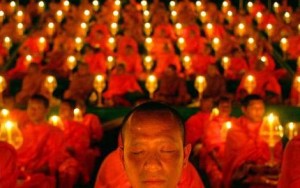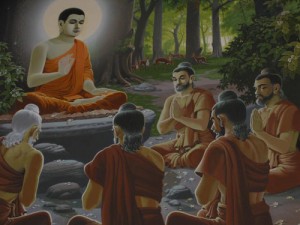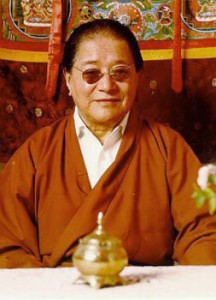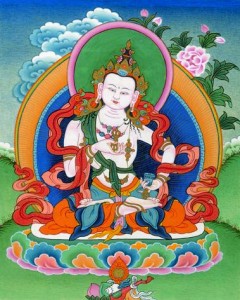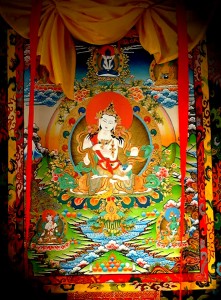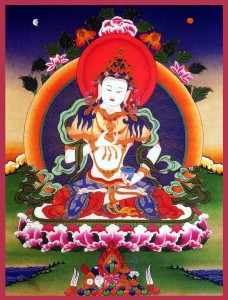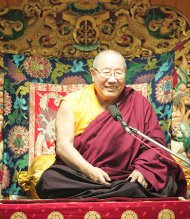An excerpt from a teaching called the Seven Limb Puja: Viewing the Guru by Jetsunma Ahkon Norbu Lhamo on October 18, 1995
We should always be in the posture of confession. We love confession, don’t we? It’s so Catholic! Well, no, we do it differently here. In Buddhism confession need not be heard by any other person. When we first got into the teachings about confession, there was a line of people waiting to come to confess to me. I thought I was going to have to build one of those booths! Now you know that confession need not be done in front of anyone else. We’re talking about spiritual confession. It need not be done in front of anyone else, but one should always be in the posture of confession. Why is that so?
First of all, we know that since beginningless time until now when we have received the teachings, we have tried to be happy but we have not known how to be happy. Isn’t that right? That means there’s a pretty good chance we have blown it, big time. And judging from the fact that we are still suffering in samsara, we know that it’s true. We know that at least 50% of the time, we have committed non-virtuous acts: at least 50% of the time, just by the law of chance.
Suppose you came to see the Guru but you didn’t change your clothes. And you had shit all over you, really stinky. You walked through mud and you had mud all over you, and maybe you even shit in your pants. That’s what we did until we got here. We just shit in our pants. We didn’t care. We didn’t know. So you=ve got a load, like a kid with a slung-low diaper. We’re walking in like that! And we stink and we’re nasty. If you were going to see Guru Rinpoche, don’t you think you would clean up a bit? Do you think you might clean up a bit?
Think of confession in the same, exact way. Think that you’re always in the face of the Guru, that you are always in the presence of that primordial nature. Yet you know that to simply fake it and put on a quasi-pseudo spiritual face is not going to cut it because you’re not looking at a being, you’re not looking at something samsaric that wouldn’t know the difference. You are in the presence of the primordial wisdom nature. All things are revealed.
Being in a posture of confession doesn’t mean that you’re constantly repeating verbal confessions in your head. That would make you nuts, especially if you’re trying to offer and pay homage at the same time! But the posture of confession is a little bit different, and here we’re talking about subtleties. For those of you that love to be black and white, this is going to take some cooking on the back burner for a while. We’re talking here about a subtleness, a posture of confession. That means that for the first time in our samsaric lives we are not trying to hide our non-virtue, and play the game of acting spiritual on top of that. There is a natural to-the-bone honesty of realizing that you are a being wandering lost in samsara, realizing what it took to get that wandering and that lost in samsara, and realizing that that’s what you’re holding here. With that kind of awareness, there is the profound wish for all such causes of suffering, all such non-virtue, to be purified. So that would be a posture of confession: I know that I have engaged in non-virtuous conduct of all kinds. I have no illusions and I do not try to pretend or shut it down or make nicey-nice with with my superficial face. I do not pretend that none of this has happened. I am truly, within the deepest part of my heart, a penitent person. I am constantly in that posture. I am realizing that I have performed non-virtue and in the face of the Guru I wish to hold that up as though dewdrops were being held up in the sun. And that sun has the same capacity that the sun has naturally: that by the light of midday those dewdrops will all be gone — if we don’t hide them under a rock, pretend they don’t exist and put them away somewhere. Instead, we hold them up in the act of penitence and compassion and honesty. With complete confidence that this non-dual emptiness and luminosity, like the sun, will burn away all such poison.
Rather than being somebody who is doing shuck and jive, trying to dance, trying to pretend that we’re all goody two-shoes, rather than committing that horrible non-virtue, instead, we are in a posture of honesty. And in that posture of honesty, the heart is relaxed and the mind is opened. The non-virtue, in that posture, begins to evaporate like the dewdrops do.
© Jetsunma Ahkön Lhamo
